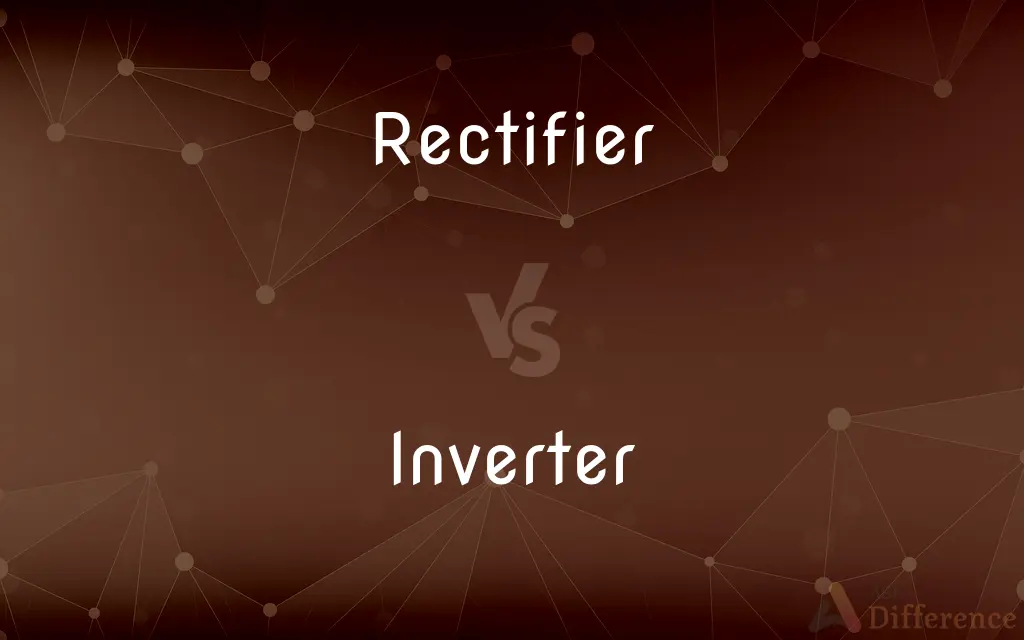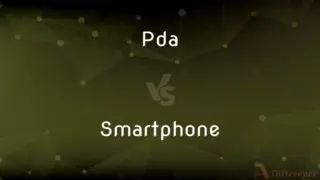Rectifier vs. Inverter — What's the Difference?
By Fiza Rafique & Urooj Arif — Updated on May 7, 2024
A rectifier converts alternating current (AC) to direct current (DC), while an inverter converts direct current (DC) to alternating current (AC).

Difference Between Rectifier and Inverter
Table of Contents
ADVERTISEMENT
Key Differences
A rectifier takes an AC input and transforms it into DC output by allowing current to flow in only one direction. An inverter, on the other hand, uses DC as an input and converts it to AC output by switching the current direction periodically.
Rectifiers are essential in electronics where devices like power supplies require stable DC power. In contrast, inverters are vital for systems needing AC power, such as solar energy setups or uninterruptible power supplies (UPS), which often store energy in DC batteries.
Rectifiers can be categorized as half-wave or full-wave, based on how effectively they convert AC to DC. Inverters, however, can be either modified sine wave or pure sine wave, depending on the quality of the AC output.
Rectifiers are often used in everyday devices such as phone chargers and household appliances. Inverters are commonly used for renewable energy systems and to power AC devices from DC sources like batteries.
Comparison Chart
Input
Alternating Current (AC)
Direct Current (DC)
ADVERTISEMENT
Output
Direct Current (DC)
Alternating Current (AC)
Function
Converts AC to DC
Converts DC to AC
Types
Half-wave, full-wave
Modified sine wave, pure sine wave
Applications
Power supplies, electronics
Renewable energy systems, UPS, vehicles
Compare with Definitions
Rectifier
A device converting AC to DC.
The phone charger uses a rectifier to convert household AC to DC.
Inverter
A device converting DC to AC.
The solar inverter converts the stored DC power into AC for household use.
Rectifier
An electronic circuit allowing current in one direction.
The bridge rectifier allows current to pass only in a single direction.
Inverter
A component generating high-quality AC output.
The pure sine wave inverter provides a stable AC supply for sensitive devices.
Rectifier
A component used to eliminate AC ripple.
The full-wave rectifier provides a smoother DC voltage with minimal ripple.
Inverter
A device commonly found in vehicles.
The RV has an inverter to power AC devices using the vehicle's DC battery system.
Rectifier
A device essential for DC applications.
The laptop adapter contains a rectifier to charge its internal DC battery.
Inverter
An electrical device used in renewable energy systems.
The wind turbine system employs an inverter to supply AC power.
Rectifier
An electrical component used in power supplies.
The rectifier in the power supply provides stable DC output for the circuit.
Inverter
An electronic circuit reversing current direction.
The inverter circuit generates an AC waveform from DC batteries.
Rectifier
A rectifier is an electrical device that converts alternating current (AC), which periodically reverses direction, to direct current (DC), which flows in only one direction. The reverse operation is performed by the inverter.
Inverter
An apparatus which converts direct current into alternating current.
Rectifier
An electrical device which converts an alternating current into a direct one by allowing a current to flow through it in one direction only.
Inverter
A device that converts either of the two binary digits or signals into the other.
Rectifier
One that rectifies
A rectifier of many wrongs.
Inverter
One that inverts or produces inversion.
Rectifier
(Electronics) A device, such as a diode, that converts alternating current to direct current.
Inverter
A device used to convert direct current into alternating current.
Rectifier
A worker who blends or dilutes whiskey or other alcoholic beverages.
Inverter
An electronic device whose output reverses the sign of its input current or voltage, thereby shifting the phase of alternating current signals by 180 degrees. Also called phase inverter.
Rectifier
Something that rectifies.
Inverter
Something that inverts, or causes inversion.
Rectifier
A device that converts alternating current into direct current; often a diode.
Inverter
(electrical engineering) A power inverter.
Rectifier
(nautical) An instrument used for determining and rectifying the variations of the compass on board ship.
Inverter
An electrical converter that converts direct current into alternating current
Rectifier
(artificial neural networks) The activation function , where x is the input to a neuron.
Rectifier
One who, or that which, rectifies.
Rectifier
Specifically: (a) (Naut.) An instrument used for determining and rectifying the variations of the compass on board ship. (b) (Chem.) A rectificator.
Rectifier
Electrical device that transforms alternating into direct current
Rectifier
A person who corrects or sets right;
A rectifier of prejudices
Common Curiosities
Do both devices use semiconductors?
Yes, both rectifiers and inverters rely on semiconductor devices to manage the current flow.
Is a bridge rectifier more efficient than a half-wave rectifier?
Yes, a bridge rectifier can convert more of the AC signal into usable DC power.
Is a pure sine wave inverter better than a modified sine wave?
Yes, a pure sine wave inverter provides smoother AC power that is suitable for sensitive electronics.
Are rectifiers necessary for DC-DC converters?
Not directly, as DC-DC converters usually step up or step down voltage within a DC circuit.
Do rectifiers require cooling?
Some high-power rectifiers generate heat and require cooling solutions like heatsinks.
Can a rectifier output high voltage DC?
Yes, rectifiers can deliver high voltage DC if the input AC is correspondingly high.
Can inverters also store energy?
Inverters themselves don't store energy but work with batteries or other DC sources that do.
Can a rectifier be used in place of an inverter?
No, because they serve opposite functions. A rectifier converts AC to DC, while an inverter converts DC to AC.
Are rectifiers and inverters interchangeable?
No, as rectifiers and inverters serve different roles in power conversion.
Do inverters only work with batteries?
Not exclusively, though inverters are often paired with batteries, especially in renewable energy systems.
Are rectifiers used in all power supplies?
Most electronic power supplies rely on rectifiers to deliver stable DC output.
Do rectifiers use more energy than inverters?
Not inherently. Energy consumption depends on the design and application of each.
Are inverters noisy when operating?
Some older models may produce noise, but modern inverters often include noise-reduction technology.
Can inverters provide continuous power output?
Yes, as long as the connected DC power source is available and sufficient.
Are inverters only used for renewable energy systems?
No, they are also used in various applications like UPS systems, vehicles, and mobile devices.
Share Your Discovery

Previous Comparison
Dysentery vs. Cholera
Next Comparison
PDA vs. SmartphoneAuthor Spotlight
Written by
Fiza RafiqueFiza Rafique is a skilled content writer at AskDifference.com, where she meticulously refines and enhances written pieces. Drawing from her vast editorial expertise, Fiza ensures clarity, accuracy, and precision in every article. Passionate about language, she continually seeks to elevate the quality of content for readers worldwide.
Co-written by
Urooj ArifUrooj is a skilled content writer at Ask Difference, known for her exceptional ability to simplify complex topics into engaging and informative content. With a passion for research and a flair for clear, concise writing, she consistently delivers articles that resonate with our diverse audience.
















































